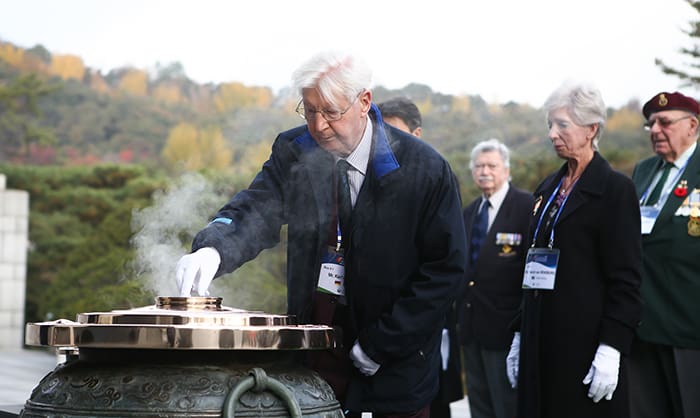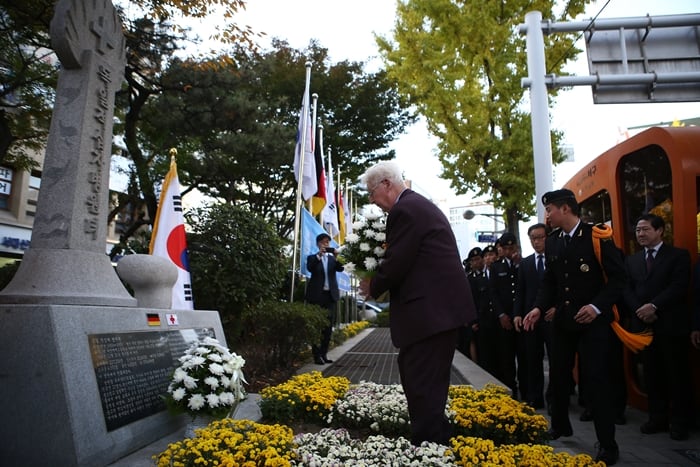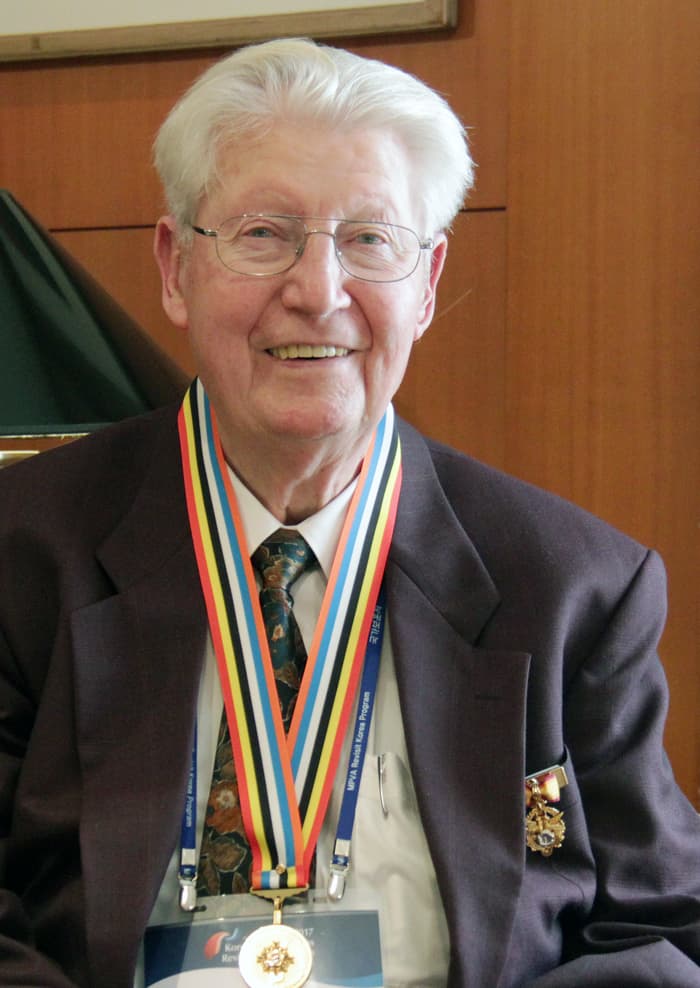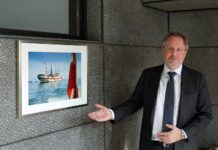
Karl Hauser, an engineer who worked alongside German medical personnel in Busan following the Korean War, visits the Seoul National Cemetery to pay his respects on Nov. 10. (Ministry of Patriots and Veterans Affairs)
By Min Yea-Ji and Kim Young Shin
Seoul | Nov. 12, 2017
“I find Korea’s capacity for reconstruction and development to be truly amazing.”
Karl Hauser, an engineer who worked alongside German medical personnel in Busan following the Korean War, from 1954 to 1959, uttered these words upon visiting the port city again for the first time in some six decades.
This past July, Hauser met with President Moon Jae-in in Berlin, during the president’s official state visit to Germany and on the sidelines of this year’s G20 Summit.
At that meeting, President Moon presented Hauser with a presidential award for his services in the aftermath of the Korean War. In return, Hauser gave the president a copy of the journal of German doctor Stefan W. Escher, which has detailed records of the situation in Korea after the war.
Four months later, the Ministry of Patriots and Veterans Affairs invited Hauser to visit Korea after 58 years. He toured Seoul and Busan and stopped by the Seoul National Cemetery, the site of the German Red Cross Hospital in Busan and the War Memorial of Korea.
After his five-nights-six-day trip on Nov. 12, Korea.net sat down with Houser. On his chest was the presidential award and around his neck was the ambassador of peace medal that he received from the Minister of Patriots and Veterans Affairs Pi Woo-jin.

Karl Hauser, an engineer who worked as a member of the German medical personnel in Busan in 1954, lays a wreath at the site of the German Red Cross Hospital in Busan on Nov. 11. (Ministry of Patriots and Veterans Affairs)
– You came back to Korea after 58 years. What changes did you notice?
I went to Busan yesterday and everything has changed.
From what I remember, Busan was just a semi-circle of barracks with tin roofs. Residents made their roofs out of cans and the barracks where the U.S. Army stayed also had tin roofs.
However, all the buildings in Busan now are modern, high and beautiful. Someone asked me if I remembered where I was in Busan, and I couldn’t even guess. When I left Korea, everything was in ruin. Korea’s reconstruction ability is purely amazing.
– How did you come to Korea, back in the day?
At that time, the German Red Cross made a notice to recruit medical personnel to work in Busan. Anyone with a job and a driver’s license could apply. I was young, at 24, and I had no family I had to support. It was the adventurer in me. I thought ‘why not?’ and applied for the position.
– Do you remember any episodes from those times?
In Busan, I was assigned to work as an engineer at the German hospital with an American. The Busan government supplied 80 percent of the electricity used by the hospital and we had to generate the remaining 20 percent. A diesel engine generator made its “brrrr” noise all night. We didn’t know when the electricity would fail, so we slept next to the engine to be ready. I slept well when the engine was making its noise, but woke up when the sound stopped. I went back to sleep after turning the engine on again.
One time, I had to travel from Busan to Seoul on a train and it took 24 hours. I remember that I took food and drinks on the train. At that time, theft was common, so when a person was away, the others had to take care of their belongings.
– What did you talk about when you had a meeting with President Moon Jae-in in July in Berlin?
I received the presidential award. It was a great time.
He asked me how old I was, and how Busan was back then. I heard that the president’s mother was also from Busan. To express our thanks, my wife presented a bundle of flowers to first lady Kim Jung-sook and I gave the president a copy of “Das Jahr in Pusan,” the journal of German doctor Stefan W. Escher who served in Busan.
– Do you have a message to the people of Korea?
Korea is still a divided nation. However, unification can happen at any time. Just like the way Germany became one again. I heard that the leader of North Korea studied in Switzerland. If he knows German, he might know about the history of German unification.

Karl Hauser, who served as an engineer alongside German medical personnel that served in Korea from 1954 to 1959, wears his presidential award on his chest and the ambassador of peace medal around his neck. (Min Yea-Ji)
jesimin@korea.kr







![[K-brand-promoting ethnic Koreans ⑤] Spreading taekwondo ‘spirit’ in Singapore](https://gangnam.com/file/2024/02/20231129124433000_ENU3D0FB-218x150.png)















